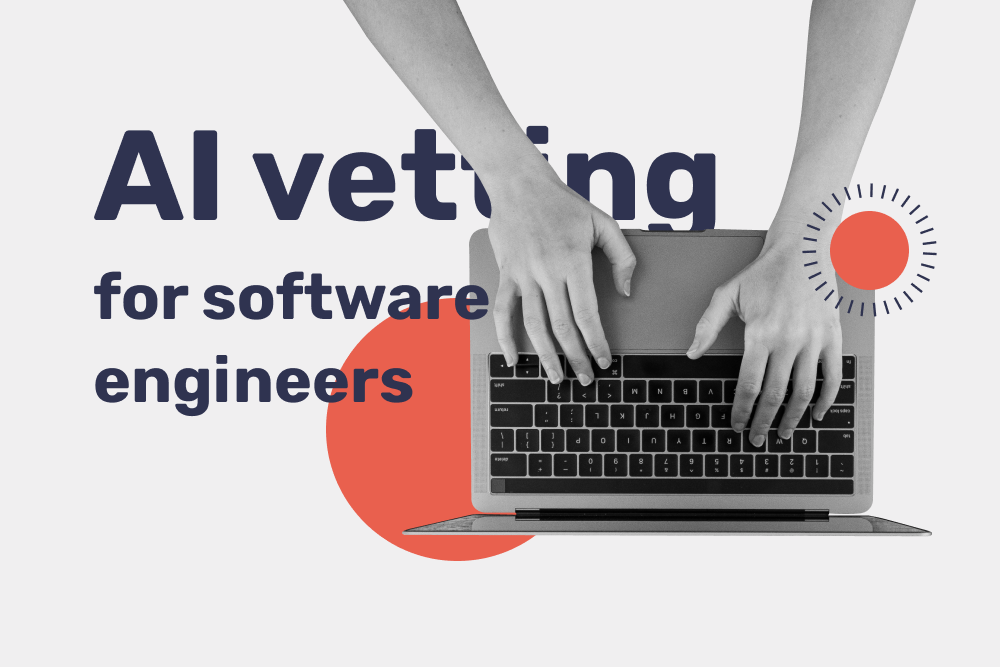Leveraging an Ethereum blockchain can become a game-changer for your company’s operations efficiency, security, and transparency. However, transforming your business processes thanks to the blockchain is impossible without the professional help of Solidity developers, the most sought-after engineers on the market. Shortly after the emergence of this programming language, our tech talent sourcing agency witnessed many businesses willing to attract Solidity developers for their projects, but could not find the right fit. So we set out to help them out.
Based on the wealth of experience we managed to get, in this article, we would be glad to share the main rules we follow when sourcing Solidity programmers for companies across the globe. But before that, let us briefly explain why it is so hard to hire Solidity engineers.
What makes hiring Solidity developers challenging?
While the demand for Solidity developers is increasing rapidly, there are several challenges that companies face when trying to hire them.
- It is a complex programming language. Solidity was developed in 2014 specifically for writing smart contracts on the Ethereum blockchain and is now considered the most popular technology. In a study on smart contract software metrics published in PLOS ONE, Solidity was found to be the most used smart contract programming language. Being designed for developing smart contracts on the Ethereum blockchain, Solidity programmers have to deal with unique challenges and constraints that are not present in traditional software development, making the process of hiring skilled Solidity developers a daunting task.
- Limited resources. Again, since Solidity is a relatively new programming language, there are few resources available for learning it compared to more established languages, making most skilled Solidity developers basically self-taught. At the same time, the blockchain market is evolving at a rapid pace, and for Solidity developers it means an acute need to keep pace with the latest technologies, data privacy, and cybersecurity best practices.
- Solidity developers are in high demand but in short supply. According to recent research, the Ethereum ecosystem is estimated at only 200,000 developers. At the same time, there are hundreds of job postings for Solidity developers on job boards and freelance platforms.
- There are no clearly defined industry regulations for a Solidity developer salary. The average salary for a Solidity developer varies depending on location, experience, and other factors, but can range from $120,000 to $250,000 per year, which makes defining a fair wage for your future hires challenging.
- Evaluating Solidity developers’ skills is difficult and almost impossible for a non-technical person. Due to the language’s young age, there are no standardized evaluation criteria for Solidity developers’ skills. It’s also obvious that the one who evaluates such skills should have an even deeper knowledge of Solidity programming than a candidate, which is not the case for the majority of business owners.
But despite all the challenges, hiring Solidity developers is an achievable goal, especially if you follow the next practice-proven rules and have a tech talent sourcing partner like Bridge nearby.
5 key rules to hire Solidity developers
Now, let’s find out how to find Solidity developers, evaluate their skills correctly, match their expectations, and finally, hire them with confidence.
Define the project requirements in advance
When it comes to hiring software developers, the first and the most important rule sounds as follows – the clearer your project requirements are, the higher the chances of finding the perfect-fit candidates. At the same time, it is actually difficult to define the requirements for the projects being created for an emerging field such as Ethereum. The ones you define today may change tomorrow because of the rapidly evolving field and dynamic business environment, so below are some future-proof tips.
- Prioritize your requirements based on their importance and impact on the project. For example, if you have a limited budget for your project development, then you should define the limit for your future Solidity developer’s salary as well.
- Align the vision of the stakeholders. Aligning stakeholders’ visions is critical for project development and hiring decisions since it allows for avoiding misunderstandings, conflicts, and delays in the project timeline. So, take your time to discuss your project requirements in detail, including but not limited to the skills and qualifications you would like to see in your perfect candidate. Documenting these requirements is also a good practice to ensure everyone stays on the same page.
Make sure the requirements you have for Solidity developers are testable
After you have defined and aligned the requirements for your future Solidity developers, you have to double-check them and make sure they are testable. The matter is that defining testable requirements is the only way to make sure that the candidate actually has the necessary skills and qualifications that match your expectations.
Let’s compare a testable and non-testable requirement for Solidity developers:
| Non-testable requirement | Testable requirement |
| The developer should have a deep understanding of blockchain technology. | The developer should be able to write and deploy a smart contract on the Ethereum blockchain. |
| This requirement is non-testable because it is subjective and cannot be measured. What one person considers a “deep understanding” may not be the same for another person. There is no clear way to test if the developer meets this requirement. | This requirement is testable because it has a specific measurable outcome. The development team can verify that the developer has the skills to write and deploy a smart contract on the Ethereum blockchain. |
What’s more, when you have testable requirements, you are less likely to fail at the evaluation stage.
Create a clear Solidity developer’s skills evaluation framework
Evaluating Solidity developers’ skills is the most difficult step on the way to hiring them. So, after you have decided on the requirements and made sure they are testable, consider using our evaluation framework below. It will help you assess the Solidity developer’s knowledge and skills in blockchain architecture, smart contract development, Web3.js, DApp development, and security. It also provides sample evaluation tasks and questions, as well as performance standards for each of the evaluation criteria.
| Evaluation criteria | Evaluation tasks and questions | Performance standards |
| Blockchain architecture: knowledge of nodes, chains, miners, and blocks | Explain the role of miners in the blockchain network. | The developer must demonstrate an understanding of the role of miners in the blockchain network. |
| Smart contract development: knowledge of Solidity syntax, data types, and control structures | Write a smart contract that performs a specific function, such as a token sale. | The smart contract must meet specific functional requirements and be free of syntax errors. |
| Web3.js: knowledge of JavaScript and interacting with Ethereum blockchain and smart contracts | Use Web3.js to interact with a deployed smart contract and retrieve data from it. | The developer must be able to interact with a deployed smart contract and retrieve data from it. |
| DApp development: knowledge of front-end development of decentralized applications | Develop a front-end interface for a decentralized application that interacts with a smart contract. | The front-end interface must be functional and user-friendly. |
| Security: knowledge of common vulnerabilities in smart contracts and best practices for avoiding them | Explain how a specific vulnerability, such as reentrancy, can be avoided in a smart contract. | The developer must demonstrate an understanding of how a specific vulnerability can be avoided in a smart contract. |
While the framework we provided will give you an idea of the competencies you have to evaluate, you must still have the technical knowledge to assess the Solidity developers’ skills correctly. But if you have little to no technical background, consider the next tips for coping with this task anyway.
- Hire a third-party tech consultant. If you are just getting started with a Solidity development project, hiring a Solidity development consultant will be the right way to go. They will help you make sure that the competencies of your chosen candidates actually match your project requirements.
- Hire pre-vetted Solidity developers. As for one more option, that’s even easier than the previous one, you can consider hiring Solidity developers whose skills are already vetted rigorously. We, at Bridge, can help you hire remote Solidity developers with a proven success record, making sure that the candidates suggested by us meet your project requirements perfectly.
Apply for our sourcing-as-a-service now to meet Solidity candidates in 5 days!
Define the platforms you will use to look for Solidity developers
After you have defined your project requirements, made sure they are testable and found a way to evaluate the candidates’ technical skills, it’s time to start looking for Solidity developers for hire. We recommend getting started with building a talent pool using all the channels available.
As usual, you can post your job ad on Indeed or Glassdoor, and wait for the candidates to apply on their own. As practice shows, this is the most obvious, but still the most time-consuming way to hire Solidity programmers, since the majority of applicants at these platforms are passive job seekers.
Hidden Gem: Best Sourcing Channels for Tech Talent Acquisition
As for one more option, you can start looking for Solidity developers and reaching out to them on LinkedIn, expanding your professional network at once. Also, keep in mind that there are platforms dedicated to hiring blockchain developers specifically, like Web3Careers.
Important tip!
- Save your time and effort with sourcing-as-a-service. Looking for Solidity developers on your own, screening their CVs, and pre-vetting them on your own takes a lot of time and effort. That’s why we suggest using a more effective approach. With our sourcing-as-a-a-service, you will be able to meet pre-vetted candidates, carefully selected for your position by our sourcers.
Make sure you’ve offered reasonable compensation to your candidates
The last important rule for hiring Solidity developers coming from our team is to make sure that your offered salary range matches the expectations of your candidates. Sure thing, they will differ depending on the specialist’s qualification and location, so let’s take a look at the average Solidity developers’ salary level.
Average Solidity developers’ salary in the US by seniority
Let’s get started with discovering how much Solidity developers make in the US depending on their seniority. As you can see below, a Junior specialist makes two times less than a Solidity developer of a Senior level, which makes the latter one of the highest-paid specialists in the ICT industry.
| Seniority level | Average annual Solidity developer salary ($) |
| Junior Solidity developer | $50,000 |
| Middle Solidity developer | $82,100 |
| Senior Solidity developer | $100,000 |
Average Solidity developer’s salary worldwide
The chart below describes Solidity developers’ salary level worldwide which is also pretty high and can sometimes reach approximately the same level as in the US.
| Country | Average annual Solidity developer salary ($) |
| Mexico | $82,000 |
| Brazil | $60,000 |
| Portugal | $87,000 |
| Germany | $75,000 |
| The Czech Republic | $80,000 |
| Ukraine | $60,000 |
So, how can you know what salary would be right and fair for your future Solidity developers? Follow the simple tips below.
- Align the salary with the seniority level of the developer. As you can see from the chart above, the Senior Solidity developers earn twice higher as entry-level specialists. You can be guided by this formula too when defining the salary range for your candidates.
- Take the local market average wage and standard of living into account. It would also be wise to get an idea of the average salary in the country you plan to hire software developers from. But expect a visible salary gap. The Solidity programmers get on average 15-20$ higher salary compared to other ICT specialists.
Hire Solidity developers effortlessly with Bridge
So, hiring Solidity developers can be both challenging and costly, especially if you plan to do it on your own. That’s why we can take the burden off your shoulders and help you hire Solidity programmers pitfalls-free and at a predictable cost. With our sourcing-as-a-service, you get access to 900k-wide development talent with our data-driven talent sourcing engine carefully matching the candidates with your requirements. Since our talent sourcing process is heavily automated, you can save up to 60% of the hiring budget and get your first candidates not in months, but in days.
Drop us a line now to hire Solidity developers with a proven success record!



